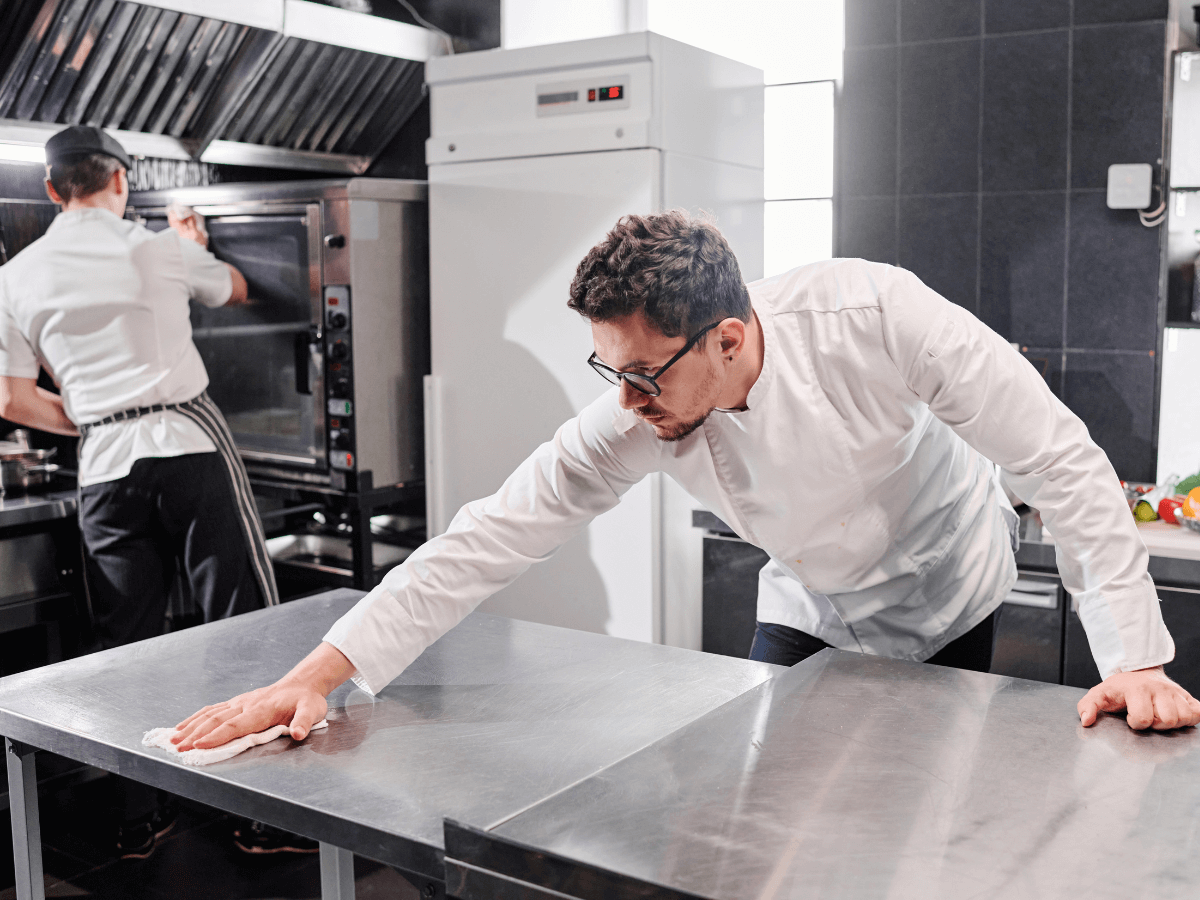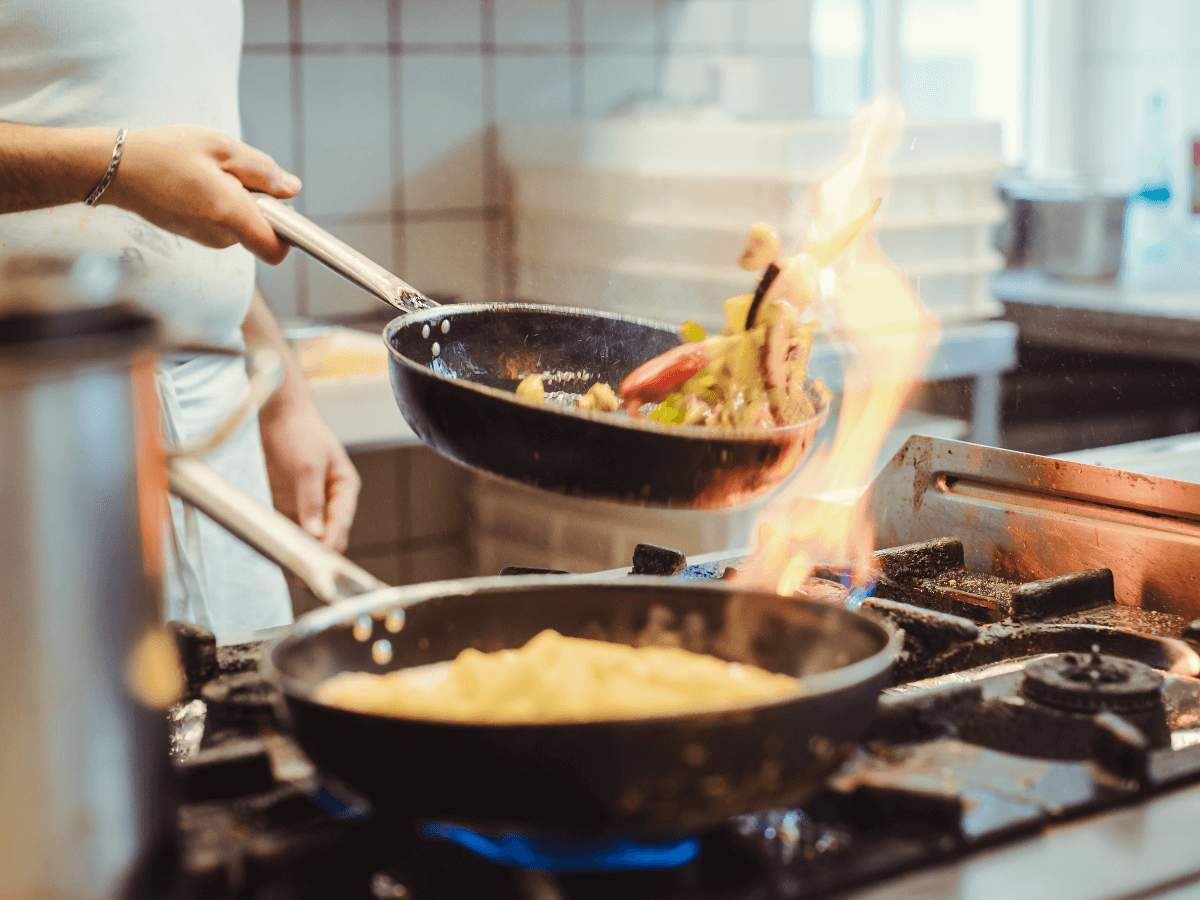Keeping a kitchen clean and sanitary is absolutely crucial for food service establishments, ranging from restaurants, fast food establishments, food trucks, coffee shops, and more. Not only does a spotless kitchen ensure the well-being of customers, but it also contributes to a positive reputation for the establishment. That is why at Happy Housekeepers — a Professional Cleaning Service Company, we’ve gathered valuable insights and expert advice from experienced housekeepers on how to achieve and maintain a sparkling clean and hygienic kitchen. From regular maintenance to specialized tasks like commercial cleaning and grease trap cleaning, we’ll cover all the essential tips for upholding top-notch hygiene standards in the bustling restaurant industry. So, let’s dive in and explore these key practices for a healthy and pristine kitchen environment.

Prioritize Regular Cleaning and Deep Cleaning
Regular cleaning is vital in any kitchen, but deep cleaning is equally important to eliminate hidden germs and bacteria. To effectively maintain cleanliness, establish a cleaning schedule that includes daily tasks such as wiping down surfaces and sanitizing cooking utensils. Additionally, set aside specific times for deep cleaning to ensure a thorough elimination of dirt, dust, and grime.
Establish a Cleaning Schedule:
Designate specific times for cleaning different areas of the kitchen, including countertops, appliances, floors, and storage spaces. Consistency is key to preventing grease buildup and bacterial growth. Create a checklist to ensure all tasks are completed regularly.
Invest in Quality Cleaning Products:
Use commercial-grade cleaning products and sanitizers that are approved for restaurant use. Ensure they effectively eliminate bacteria, viruses, and other pathogens commonly found in kitchen environments. Regularly inspect and replace cleaning tools such as sponges, brushes, and mop heads to prevent cross-contamination.

Adopt Proper Food Handling Techniques
Food safety is paramount in any food service establishment. Implementing proper food handling techniques can prevent cross-contamination and ensure the health and well-being of patrons. Train staff on safe food handling practices, such as separating raw and cooked foods, using color-coded cutting boards, and regularly monitoring refrigerator and storage temperatures.
Focus on Garbage Disposal
To maintain cleanliness and eliminate foul odors, proper management of garbage disposal is crucial. Ensure that garbage bins are kept covered and emptied regularly. Implement a waste management system that adheres to local regulations and promotes cleanliness within the kitchen environment.
Embrace Tools and Technology
In today’s fast-paced restaurant industry, the efficient utilization of tools and technology can revolutionize kitchen cleanliness. Invest in high-quality cleaning equipment, such as steam cleaners and commercial-grade dishwashers, to enhance productivity and maintain a sanitary environment. Additionally, explore modern solutions like touchless faucets and soap dispensers to minimize the spread of germs.
Train and Educate Staff
Properly training and educating restaurant staff is essential for maintaining kitchen cleanliness. Conduct regular training sessions to familiarize employees with best practices in restaurant hygiene. Encourage open communication and regular feedback to address any concerns or suggestions regarding cleanliness and sanitation.
Ensure Superior Cooking Practices
Apart from cleanliness, superior cooking techniques also play a vital role in maintaining a sanitary kitchen environment. Emphasize proper cooking temperatures, particularly when handling grilled meats, to prevent bacterial growth. Regularly calibrate thermometers to ensure accuracy and adhere to food safety regulations to avoid potential health risks.
Implement Effective Pest Control Measures
Pests can pose serious health risks and damage a restaurant’s reputation. Prevent pest infestations by implementing effective pest control measures. Regularly inspect and seal potential entry points, maintain cleanliness to eliminate food sources, and consider professional pest control services as a preventive measure.
Attention to Detail in Dining Areas
While the focus is usually on the kitchen, attention to detail in dining areas is equally important. Ensure that tables, chairs, and all surfaces are regularly cleaned and sanitized. Pay special attention to items that are frequently touched, such as door handles and menus, which have become even more critical in the wake of the COVID-19 pandemic.
Organize Storage Spaces
Keep ingredients, utensils, and equipment neatly organized to facilitate efficient cleaning and prevent clutter. Use labeled containers and shelves to streamline inventory management and minimize the risk of spills or spoilage. Implement a “first in, first out” (FIFO) system to rotate perishable items and reduce waste.
Train Your Staff
Properly train your kitchen staff on hygiene practices and cleaning procedures. Emphasize the importance of handwashing, sanitizing surfaces, and storing food at the correct temperatures. Encourage teamwork and accountability to maintain cleanliness throughout shifts.
Maintaining a clean and sanitary kitchen is essential for any food service establishment, from fast-food restaurants, modern restaurants to full-service restaurants. By following the expert advice shared, including prioritizing regular cleaning and deep cleaning, adopting proper food handling techniques, focusing on garbage disposal, embracing tools and technology, training and educating staff, ensuring superior cooking practices, implementing effective pest control measures, and paying attention to detail in dining areas, you can create a clean and sanitary kitchen environment for your customers. Implement these tips to not only promote the health and well-being of patrons but also enhance your restaurant’s reputation in a competitive industry.

